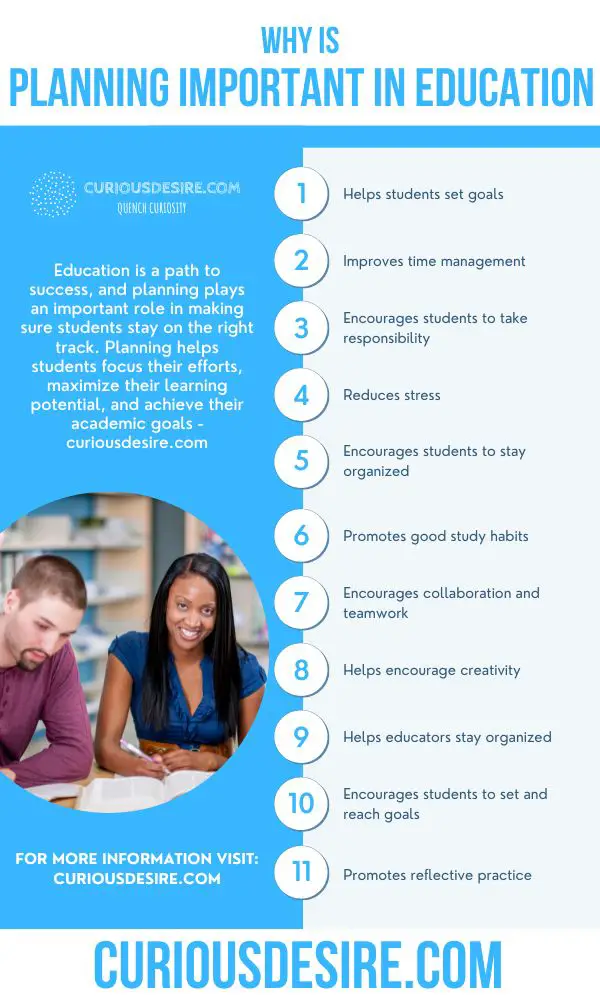Education is a path to success, and planning plays an important role in making sure students stay on the right track. Planning helps students focus their efforts, maximize their learning potential, and achieve their academic goals.
It also provides a structure for teachers to organize lessons so that they can be delivered effectively and efficiently.
With proper planning, both educators and learners can make the most out of the educational experience. In this article, we’ll explain 15 reasons why planning is important in education.
15 Benefits of Planning in Education
Planning is essential for successful learning outcomes. It helps educators. Here are 15 reasons why planning is important in education.
1. It helps students set goals and guides them towards success
Planning helps students to identify their academic goals and develop a plan of action to help them achieve those goals. This could include setting regular study timetables, using different teaching methods, or even taking part in extra-curricular activities.
Through this process, students can break down complex tasks into smaller, more manageable pieces and take the necessary steps to reach their goals.

2. Planning in education Improves time management
Planning helps students to manage their time more effectively and prioritize tasks according to their importance and urgency. They can identify the amount of time needed for each task and allocate it accordingly, ensuring that all their needs are met, and no important activities are missed out.
For instance, students can balance their time between studying, attending classes, participating in extra-curricular activities, and enjoying leisure activities.
3. It encourages students to take responsibility
By having a plan in place, students are encouraged to take responsibility for their own learning and development. This helps them become more independent, self-directed learners who are willing and able to take ownership of their actions.
Similarly, planning helps educators to identify the individual needs of each student and provide them with the necessary support and guidance. This allows for personalised learning experiences that are tailored to the student’s specific requirements.
4. Planning in education encourages students to stay organized
Planning can help students stay organized both mentally and physically. Having a plan gives them an easier way of organizing their thoughts and tasks while also helping them to stay on top of their studies.
However, it’s important to note that planning also needs to be flexible as students might need to adjust it according to their changing needs and circumstances.
5. Planning in education reduces stress
Having a plan in place can help students remain calm and focused. With an organized plan, they have an idea of what needs to be done and when, which reduces the pressure and anxiety that comes with not knowing how and when to approach tasks.
For instance, students can use planning to break down long-term goals into smaller, achievable targets that they can work towards. This allows them to make steady progress and stay motivated in their studies.
Suggested Reading
Why Planning is Important in Life?
6. Planning in education promotes good study habits
Planning helps students develop important study skills such as time management and organization, which are essential for academic success. They learn how to plan their tasks and activities in advance, allowing them to complete more within a shorter period of time.
It also teaches them how to prioritize their work and manage their workload so that they can focus on the activities that are most important for their learning.

7. It encourages collaboration and teamwork
Planning encourages students to work together in order to meet their common goals. By planning activities, tasks and assignments in advance, they can collaborate with one another and learn how to become better team players.
Planning can also help to foster a sense of community among students as they learn how to share knowledge and resources in order to achieve their desired outcomes.
8. Planning in education helps encourage creativity
Planning allows educators to come up with creative ways of teaching using various resources that are beyond traditional textbooks and lectures.
It encourages students to be more creative in their approach to learning, helping them develop important skills such as problem-solving and critical thinking.
Additionally, it can also help them to become more confident in their abilities as they become more comfortable with taking risks and exploring new concepts.
9. Planning in education helps educators stay organized
Planning allows educators to plan out the curriculum and teaching methods they will use for a given lesson or topic. This helps them stay organized and on top of their workload, making sure that all students are able to learn properly each time.
However, it’s important to note that educators should also take into account the individual needs and learning styles of their students, so they can adjust their lesson plans accordingly.
10. It allows for better assessment of student progress
By planning out the curriculum in advance, educators can assess the progress of students more effectively. They can determine which areas need improvement and adjust the lesson plan accordingly to help the students progress.
Similarly, planning also allows for better tracking of student progress as educators can review their progress over a period of time and identify areas where they need to focus more attention.
It helps them provide tailored instruction to each student that is more effective in helping them reach their goals.
11. Planning in education helps teachers to stay on track
Planning also allows teachers to stay on track with the course content and lesson plans, ensuring that all objectives are met in a timely manner.
It prevents them from getting lost or straying off topic, enabling them to focus more on student learning outcomes.
12. It encourages students to set and reach goals
Having a plan in place helps students set their own academic goals, which can be monitored and assessed over time.
It encourages them to stay motivated and work hard to achieve these goals, leading to improved academic performance. So, planning in education is an important part of ensuring students reach their full potential.

13. Planning in education promotes reflective practice
Planning also encourages teachers to take a step back and reflect on their teaching practices. This helps them to identify areas for improvement, develop new ideas and strategies, and become more effective educators overall.
For instance, it gives them the opportunity to consider different approaches and modify their lesson plans if necessary. This helps ensure that all students are getting the best possible education.
14. Planning in education supports lifelong learning
By developing plans that are tailored towards student needs, teachers can support students in developing the skills they need to be successful in life.
It helps them to become more independent and self-directed learners who are more willing and able to take ownership of their actions.
Suggested Reading
15. It encourages student engagement
Having a plan in place allows teachers to create engaging activities that can help students understand the material better. This encourages students to be more involved in their learning, leading to increased motivation and engagement.
However, it is important that teachers are mindful of the fact that no two students learn the same way and adjust their activities accordingly.
Conclusion
Overall, planning in education is an essential tool for teachers and students alike. It helps them stay organized and on track, encourages collaboration and teamwork, promotes good study habits, and allows for better assessment of student progress.
Moreover, it supports lifelong learning, encourages creativity, and promotes the reflective practice. Planning in education is a beneficial strategy that can help teachers and students alike to achieve their academic goals.